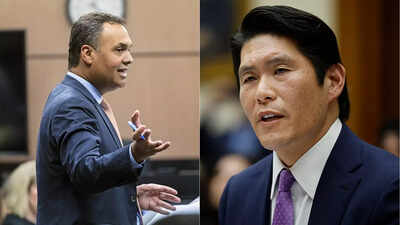Harvard’s legal defense led by Robert Hur and William Burck — men once trusted by Trump, now opposing his agenda

Harvard University is currently engaged in a high-stakes legal battle with the Trump administration, centered around the federal government’s decision to freeze more than $2.2 billion in grants and $60 million in contracts. The dispute has captured national attention, as the Trump administration seeks to impose sweeping reforms on universities like Harvard, threatening to withhold funding unless certain political demands are met. In its defense, Harvard has turned to two prominent attorneys—Robert Hur and William Burck—whose ties to the Trump administration run deep.
These legal experts are no strangers to high-profile cases in Washington. Hur, a former senior official in the Justice Department under President Donald Trump, and Burck, a longtime advisor to Trump associates, are now tasked with representing the elite university in its fight to preserve its independence. Their involvement brings a unique dynamic to the case, as both men have served in various capacities within the Trump administration, but now find themselves on the opposite side of his political agenda.
The Harvard-Trump dispute
The legal battle stems from the Trump administration’s long-standing campaign to reshape university policies by leveraging federal funding. The dispute began when the administration threatened to withhold billions of dollars from Harvard unless the university made significant changes to its campus policies, particularly those involving student activism and political influence. In response, Harvard’s lawyers, led by Hur and Burck, have argued that the university has already made substantial reforms to ensure it is a welcoming and supportive environment for all students.
As reported by the Associated Press, Hur and Burck penned a letter on January 2023, in which they emphasized that Harvard would not agree to the government’s demands. “The university will not surrender its independence or relinquish its constitutional rights. Neither Harvard nor any other private university can allow itself to be taken over by the federal government,” they stated. Harvard’s president, Alan Garber, echoed this sentiment, asserting that the government should not have the power to dictate the content of what universities teach or whom they admit.
Who are Robert Hur and William Burck?
Robert Hur is a seasoned legal professional with deep ties to the federal government. He served as the US Attorney for Maryland and was a senior Justice Department official during Trump’s first term. Hur is perhaps best known for his role as special counsel in the investigation into President Joe Biden’s handling of classified materials. His conservative credentials, which include clerking for Chief Justice William Rehnquist at the US Supreme Court, make him a respected figure across party lines. As quoted by the Associated Press, Hur has been praised for his competence and professionalism, with colleagues calling him “an exceptionally good litigator.”
William Burck, on the other hand, has a long history in Washington, including serving as a lawyer in President George W. Bush’s White House. Burck was a go-to attorney for Trump associates during the Mueller investigation into Russian interference in the 2016 election. He also defended several figures in Trump’s orbit, including former White House counsel Don McGahn and Steve Bannon. As reported by the Associated Press, Burck’s role in the Harvard case underscores his influence in legal and political circles, particularly when handling sensitive matters involving high-profile political figures.
A pivotal moment in higher education
The Harvard dispute is seen as a pivotal moment in the broader fight over political influence in higher education. The Trump administration’s tactics, which include withholding funding to force changes in university policies, have raised questions about the government’s role in regulating private institutions. Harvard’s decision to hire Hur and Burck underscores the importance of selecting legal experts with credibility across both sides of the political spectrum. As noted by Kermit Roosevelt, a law professor at the University of Pennsylvania, “They’re looking for people that the administration won’t dismiss as leftists.”
As the case progresses, it will likely set a precedent for how future administrations handle relations with elite universities and whether political pressure can be used to reshape campus culture. For now, Hur and Burck’s defense of Harvard remains a crucial moment in the ongoing battle over the role of government in higher education.





